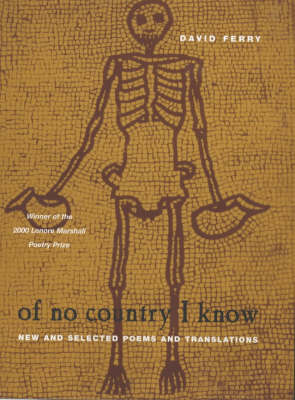Phoenix Poets
4 total works
Your Personal God From Horace, Epistles, II. 2. II. 180-89 Jewels, marble, ivory, paintings, beautiful Tuscan meter? Pottery, silver, Gaetulian robes dyed purple - Many there are who'd love to have all of these things. There are some who don't care about them in the least. Why one twin brother lives for nothing but pleasure, And loves to fool around even more than Herod Loves his abundant gardens of date-trees, while The other twin brother works from morning to night Improving his farm, ploughing and clearing the lands, Pruning and planting, working his ass off, only The genius knows, the personal god who knows And controls the birth start of every person There is in the world. Your personal god is the god Who dies in a sense when your own breath gives out, And yet lives on, after you die, to be The personal god of somebody other than you; Your personal god, whose countenance changes as He looks at you, smiling sometimes, sometimes not. To read David Ferry's "Bewilderment" is to be reminded that poetry of the highest order can be made by the subtlest of means.
This is the passionate nature and originality of Ferry's prosodic daring works astonishing transformations that take your breath away. His diction modulates beautifully between plainspoken high eloquence and colloquial vigor, making his distinctive speech one of the most interesting and ravishing achievements of the past half century. Ferry has fully realized both the potential for vocal expressiveness in his phrasing and the way his phrasing plays against - and with - his genius for metrical variation, thus becoming an amazingly flexible instrument of psychological and spiritual inquiry and which gives him access to an immense variety of feeling. Sometimes that feeling is so powerful it's like witnessing a volcanologist taking measurements in the midst of an eruption. Ferry's translations, meanwhile, are vitally related to the original poems around them.
This is the passionate nature and originality of Ferry's prosodic daring works astonishing transformations that take your breath away. His diction modulates beautifully between plainspoken high eloquence and colloquial vigor, making his distinctive speech one of the most interesting and ravishing achievements of the past half century. Ferry has fully realized both the potential for vocal expressiveness in his phrasing and the way his phrasing plays against - and with - his genius for metrical variation, thus becoming an amazingly flexible instrument of psychological and spiritual inquiry and which gives him access to an immense variety of feeling. Sometimes that feeling is so powerful it's like witnessing a volcanologist taking measurements in the midst of an eruption. Ferry's translations, meanwhile, are vitally related to the original poems around them.
Hailed as one of the best contemporary poets writing in the English language, David Ferry meditates unsentimentally, in many of these powerful and often wrenching poems, on the dispossession of people afflicted by madness, homelessness, or other forms of "wildness." The voices in all the poems in this book demonstrate how, for each of us, there is no certain dwelling place.
"David Ferry's Dwelling Places is a marvelous, extremely moving book, distinguished by Ferry's characteristic formal virtuosity, extraordinarily fresh and 'inner' translations, and a kind of driven anguished rage at both the social conditions in which human beings have to live and the mysteriously unchangeable tragedies of individual human lives. The translations amplify and deepen the contemporary scenes. I feel that in the future this will be perceived as a great book."—Frank Bidart
"Not until I had read Dwelling Places several times did I see how ingeniously resourceful, ambitious, and admirably modest a book David Ferry has made."—Boston Review
"David Ferry's Dwelling Places is a marvelous, extremely moving book, distinguished by Ferry's characteristic formal virtuosity, extraordinarily fresh and 'inner' translations, and a kind of driven anguished rage at both the social conditions in which human beings have to live and the mysteriously unchangeable tragedies of individual human lives. The translations amplify and deepen the contemporary scenes. I feel that in the future this will be perceived as a great book."—Frank Bidart
"Not until I had read Dwelling Places several times did I see how ingeniously resourceful, ambitious, and admirably modest a book David Ferry has made."—Boston Review
David Ferry's Of No Country I Know: New and Selected Poems and Translations provides a wonderful gathering of the work of one of the great American poetic voices of the twentieth century. It brings together his new poems and translations, collected here for the first time; his books Strangers and Dwelling Places in their entirety; selections from his first book, On the Way to the Island; and selections from his celebrated translations of the Babylonian epic Gilgamesh, the Odes of Horace, and of Virgil's Eclogues. This is Ferry's fullest and most resonant book, demonstrating the depth and breadth of forty years of a life in poetry.
"David Ferry must have had something up his sleeve when he called his book "Strangers," because his is a poetry of intimacy and familiarity. More than that, Mr. Ferry's short, sparse lyrics are as perfectly and simply composed as Japanese haiku—a rare accomplishment in poetry written in English."—Andy Brumer, New York Times Book Review
"Strangers is a remarkably good book for a reader sufficiently attentive to hear its quiet power, to let it work in its distinctive way."—Boston Globe
"The poems of David Ferry's Strangers are in fact one book, and it is a splendid one. There is the same austere and poignant voice throughout, asking the unanswerable things, speaking of all that is withheld from us, confronting the unknownness that dwells even in the familiar and dear. Painful and touching, the book offers a distinctive vision which is at the same time inescapably true."—Richard Wilbur
"Strangers is a remarkably good book for a reader sufficiently attentive to hear its quiet power, to let it work in its distinctive way."—Boston Globe
"The poems of David Ferry's Strangers are in fact one book, and it is a splendid one. There is the same austere and poignant voice throughout, asking the unanswerable things, speaking of all that is withheld from us, confronting the unknownness that dwells even in the familiar and dear. Painful and touching, the book offers a distinctive vision which is at the same time inescapably true."—Richard Wilbur



